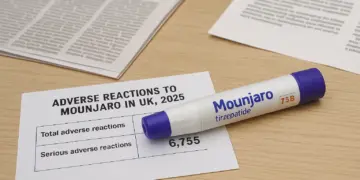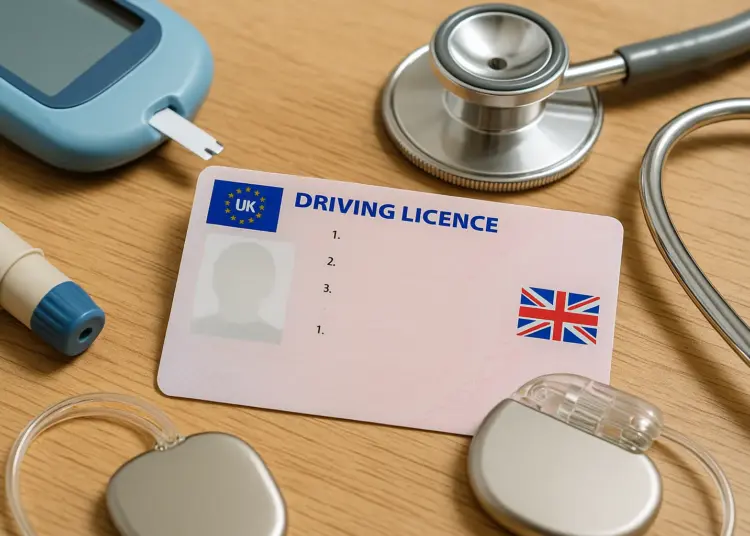Story Highlight
– Drivers must report ‘notifiable medical conditions’ to DVLA.
– Fines up to £1,000 for non-disclosure of conditions.
– Conditions include diabetes, epilepsy, and heart issues.
– GOV.UK offers resources to check medical conditions.
– Voluntary license surrender advised for safety concerns.
Full Story
Motorists in the UK are reminded of the importance of disclosing specific medical conditions to the Driver and Vehicle Licensing Agency (DVLA). These ‘notifiable medical conditions’ are those that could potentially impair driving capabilities, and failing to report them could lead to fines of up to £1,000.
Conditions considered critical for disclosure range widely, and include well-known issues such as epilepsy and sleep apnoea, which are recognised for their ability to cause sudden incapacitation. However, less commonly acknowledged conditions, such as certain types of diabetes and specific heart ailments, also necessitate reporting to the DVLA.
For those who suffer from heart-related conditions, it is important to notify the DVLA if they have an implanted defibrillator or pacemaker—devices typically used to manage heart rhythm problems. Drivers neglecting to report such medical equipment risk legal repercussions, especially if they are involved in an accident linked to their condition.
Diabetes reporting requirements are particularly stringent for individuals who have been on insulin treatment for over three months, including those facing challenges such as gestational diabetes or recurrent low blood sugar episodes. Those who manage their diabetes through non-insulin medication or lifestyle changes are encouraged to seek advice from a healthcare professional regarding their obligations to the DVLA.
An array of medical issues also falls into the notifiable category. The Government’s guidance includes, but is not limited to, the following conditions:
– Sleep apnoea
– Syncope (common fainting)
– Various heart ailments, such as atrial fibrillation
– Diabetes managed with insulin
– Glaucoma
– Dementia
– Alzheimer’s disease
– Epilepsy
– Bipolar disorder
– Stroke
– Cerebral palsy
– Severe depression
For motorists unsure about their specific situations, the official Government website offers an A-Z directory of medical conditions alongside relevant medications. This comprehensive resource helps drivers determine whether their health status may compromise road safety.
Drivers also retain the option to voluntarily surrender their driving licences if they believe that doing so is the most prudent course of action. This may apply in situations where, for example, a medical professional advises against driving for an extended period or when a driver’s condition adversely influences their ability to operate a vehicle safely.
Current policy from the Government underscores: “You must still inform DVLA about any medical condition that affects your driving. DVLA will carry out medical checks to decide if you can continue to hold a driving licence.” Until these checks are conducted, licensed drivers may continue to drive unless otherwise advised by their doctor. If the DVLA deems a driver unfit to operate a vehicle, a licence may be revoked.
It is also important to note that there are no legally mandated age restrictions regarding when one must cease driving. Drivers have the autonomy to decide when to relinquish their licence, whether due to medical concerns or other personal reasons.
If a medical condition necessitates notification, the DVLA provides clear instructions on how to report this, either through an online system or via post, with distinct forms available for different conditions.
Individuals seeking clarity on their obligation to the DVLA regarding specific medical conditions are encouraged to explore the Government’s resources, ensuring that they remain informed and compliant while prioritising road safety for themselves and others.























This is an important reminder. Failure to notify the DVLA about a notifiable medical condition can lead to fines and more serious consequences if an incident occurs. If you have diabetes, epilepsy, a heart condition or any other condition that might affect driving, check the GOV.UK guidance and speak to your GP or specialist. Reporting promptly helps protect you and other road users and ensures you remain legally covered.
This is an important reminder. Failing to notify the DVLA about a medical condition that affects driving not only risks a fine but also endangers other road users and can lead to more serious legal consequences if an incident occurs. If you have a diagnosis such as diabetes, epilepsy or a heart condition you should check the GOV.UK guidance and speak to your clinician so you understand your duty to report and any restrictions that might apply.
Absolutely correct and important reminder. Reporting relevant medical conditions protects you and other road users and reduces legal risk if an incident occurs. If you have any condition that affects alertness, consciousness, or control of a vehicle check the GOV.UK guidance and speak to your GP or consultant to confirm whether you must notify the DVLA. Keeping your licence details up to date is a straightforward step that supports road safety.
Good advice. Reporting medical conditions to the DVLA protects other road users and helps drivers stay on the right side of the law. If you are unsure whether your condition needs to be declared, check GOV.UK or speak to your doctor as soon as possible.